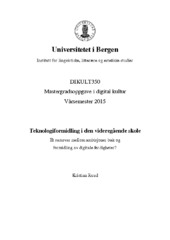Teknologiformidling i den videregående skole. Et samsvar mellom ambisjoner bak og formidling av digitale ferdigheter?
Abstract
Why does it matter to clearly define a consistent understanding of digital skills"? Digital abilities, digital skills, and digital literacy are all examples of terms that are often used to describe a broader understanding of technology in an educational context. Different terms are used to describe different aspects of technology or a rhetorical technique to explain why one understanding is more vital than others. All state funded schools in Norway must address the framework about basic skills", put up by the Knowledge Promotion Reform (Kunnskapsløftet). The basic skills are as follows: Oral skills, reading, writing, numeracy and digital skills. How society understands digital skills sets the foundation of how humans can participate in a digital setting. An understanding of digital skills also reveals the level of ambitions tied to human's digital interaction and production. The understanding of digital skills outside the classroom influences the content learned inside the classroom. My thesis is established in light of this situation. The thesis examines the conceptual understanding of the term digital skills, attempting to illuminate whether there's a consistency, between the Knowledge Promotion Reform and Norwegian high schools in their understanding of and ambitions behind the term digital skills". Influenced by methodological principles from social constructivism, narrative analysis and hermeneutics, the thesis explores statements that construct stories about digital skills from government documents, high school teachers and leaders and various research studies. My findings indicate that there is no clear consistency between the Knowledge Promotion Reform and Norwegian high schools. There is not even a clear consistency between teachers themselves. Furthermore, the results suggest three categories of understanding; technical abilities, pedagogical opportunities and abstract abilities. These findings challenge the assumption on what digital skills are and how such a skill should be realized in education. They also question the possibility to ensure a coherent understanding of the term digital skills.
